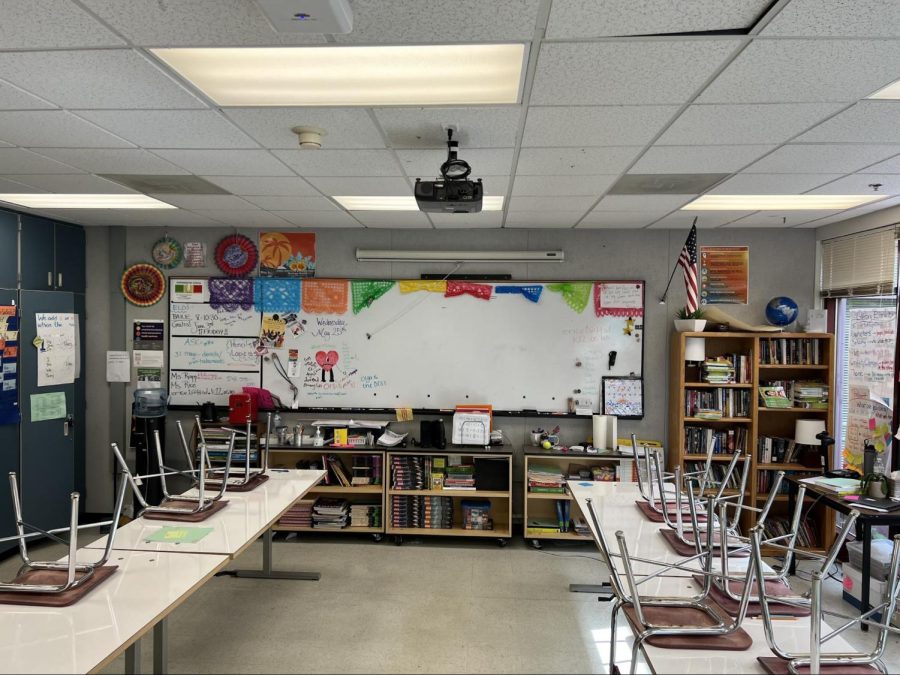How accessible is college?
American schooling is not set up to support immigrant families
The ELD classroom at Tualatin High School in which students learn English as a second language. Many international students us it as they get accustomed to American schools.
Those born with a silver spoon so often overlook the privilege they are born with, and the distinct advantage bestowed upon at birth. Americans can enjoy not only the best education in the western hemisphere, but we can take comfort every day in knowing that this education is our right from the day we are born.
However, the horizon is not as bright for those born without a white picket fence, and this access to education, tailor-made for Americans, fails to properly assist immigrants beginning fresh in America.
All through high school, parents, teachers, and school counselors relentlessly push the idea into your brain that a four-year university is the best, if not only, path to success following high school; to the credit of those doing the drilling, this is moderately true.
In general, jobs attained by people who possess a college degree are higher than those attained by people who don’t, and according to the 2020 US Census, 13.2 percent of high school graduates live below the poverty line, while only 4 percent of college graduates do. Additionally, with all of this knowledge, students with all the benefits of middle class life in the suburbs still have trouble making it to and through college.
If it’s this demanding for students with safety nets and far more support, it is difficult to fathom the herculean odds faced by typically skilled students unfamiliar with the US attempting to overcome the extraordinary challenge of going to college. One such person is M, (name shortened for privacy) a junior who had lived in the US for a little over a year at the time of my interview. She spoke in near-perfect English, having taught herself through conversation and movies over the course of a shockingly short period of four months.
She was born in Oregon, but due to legal issues, her family was forced to move back to Mexico for the majority of her adolescent life. She arrived in Oregon on the cusp of the Coronavirus pandemic and was subject to online school amidst lockdowns and restrictions. This amplified many of the problems outlined by the other students in similar situations to M, one major one being a language barrier.
M described how she had to translate all of her assignments into Spanish, and then all of her work into English before she could turn it in. Not to mention that this was in mandatory classes like English and Social Studies, ones required to continue down the path to success laid out by the high school. Most pertinently, ones required to graduate.
Another case is J, a boy who moved here from Mexico this year, where he was the valedictorian at his high school. He described how he knows everything in just about every class he is taking right now, but he is forced to take these classes again, despite learning nothing, just so he can use the classes as a way to learn English while keeping his grades at an acceptable level.
Students like these are often perceived as ordinary workers performing at a level expected of them, striving for lofty goals they hoped to one day achieve. However for M to achieve her dreams of becoming a lawyer, and for J to make it to OSU, the school he so proudly supported on his sweatshirt, the feats they had to accomplish are extraordinary. And by all accounts, they are doing it. They worked harder than most ever will in their lives to get to a point that many may presumptuously see as a bare minimum level of success. Seeing how far these students have climbed as well as how far they have ahead of them to catch up with their more privileged peers further emphasizes the sheer cliff students such as these have to scale to achieve the American school’s idea of success.
And the tragic truth of it all is that it may not even matter. When looking for subjects to interview, a class of English learners was asked which of them would like to go to a four-year college immediately after high school, a luxury many students take for granted, and not a single one raised their hand. None of them even saw it as an option. Despite college being built up to students as the one and only path to a respectable career, little social and academic infrastructure is in place to allow these students to properly demonstrate their skills and abilities in a context that would allow them to continue on to a four-year college. They are placed at higher risk to fall below the poverty line, reinforcing a cycle of poverty that has plagued immigrants for decades.









